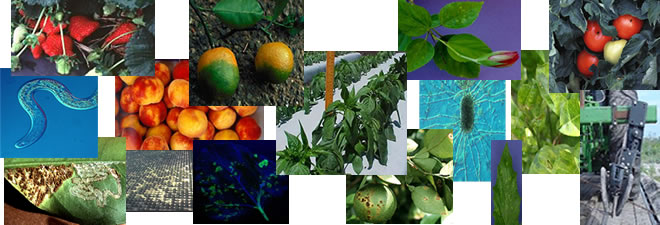Photo Carousel Links
Mission
The mission of the Subtropical Plant Pathology Research Unit is to advance the sustainable production for of citrus, vegetable, turf and ornamental crops by improving disease control, enhancing production efficiency, minimizing environmental impacts and ensuring food safety. Research is conducted on diseases caused by bacteria, fungi, nematodes, viroids, and viruses to improve pathogen detection, define disease epidemiology, provide statistically defensible survey and detection methods for early detection and monitoring, develop models for disease prediction, assess disease control strategies, identify disease resistant germplasm, evaluate field and horticultural factors which affect disease severity, and characterize the genetic basis of plant disease. New, exotic, and uncharacterized diseases are defined to estimate their potential to threaten U.S. agriculture and to limit crop loss. The impact of crop production systems and agricultural land management practices on soil health are investigated. Alternatives to methyl bromide soil fumigation are sought with an emphasis on biologically based approaches to the management of soilborne pests. Multiple diseases of citrus under investigation include citrus canker, huanglongbing (HLB), black spot, tristeza, sudden death, leprosis, and variegated chlorosis. In addition, research is conducted on endemic, emerging and other exotic diseases of an expanding variety of important crop plants such as the newly emerging watermelon vine decline caused by the squash vein yellowing virus and various tobamoviruses and potyviruses infecting vegetable and ornamental crops.

